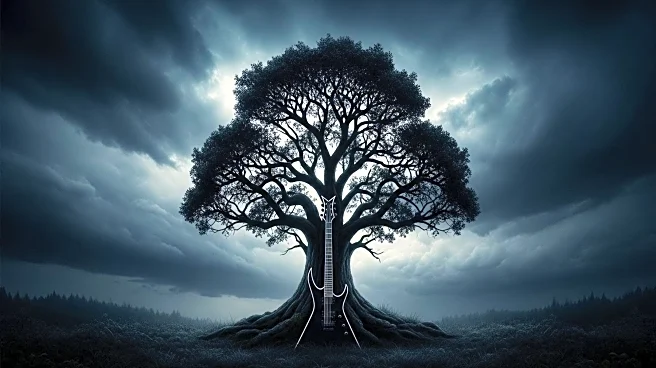What's Happening?
Los Angeles-based black metal band Agriculture has released their second full-length album titled 'The Spiritual Sound' on October 3. The band, known for its unique take on black metal, describes their style as 'ecstatic,' diverging from traditional black metal themes and production values. The album features shrieking vocals and frenetic guitar riffs, creating an atmosphere distinct from the darker tones of bands like Mayhem or Darkthrone. Agriculture's new album explores various genres, including blackgaze, with tracks like 'Dan’s Love Song' and 'The Reply' showcasing softer elements influenced by artists such as Alex G. The album is noted for its bright and passionate sound, offering listeners a cathartic experience through its eclectic mix of styles.
Why It's Important?
Agriculture's release of 'The Spiritual Sound' marks a significant contribution to the evolving landscape of black metal music. By incorporating elements from different genres and maintaining a bright, passionate sound, the band challenges traditional perceptions of black metal, which often emphasize darker themes. This album could influence other artists within the genre to experiment with new sounds and styles, potentially broadening the appeal of black metal to a wider audience. The band's approach also highlights the ongoing innovation within the music industry, demonstrating that artists continue to push boundaries and redefine genres.
What's Next?
As Agriculture's album gains traction, it may attract attention from both fans of traditional black metal and those interested in experimental music. The band's record label, The Flenser, is known for managing artists who explore dark and avant-garde music, suggesting that future releases from Agriculture and similar bands could further expand the genre's boundaries. Additionally, Agriculture's unique sound may inspire collaborations with artists from other genres, fostering a more diverse musical landscape.
Beyond the Headlines
Agriculture's 'The Spiritual Sound' not only challenges musical norms but also raises questions about the cultural and artistic significance of genre blending. By defying conventional black metal aesthetics, the band invites listeners to reconsider the emotional and spiritual dimensions of music. This approach may encourage a broader dialogue about the role of music in expressing complex human experiences, potentially influencing how artists and audiences engage with music as a form of art.










